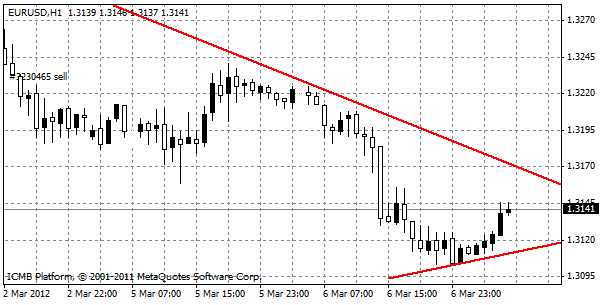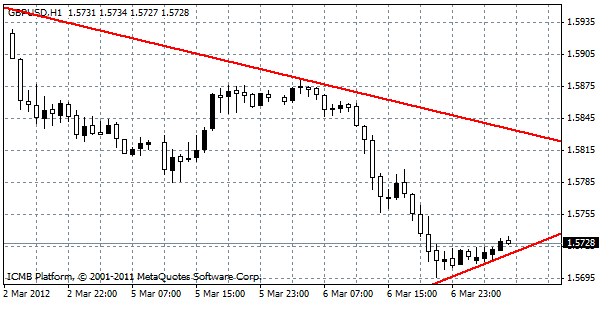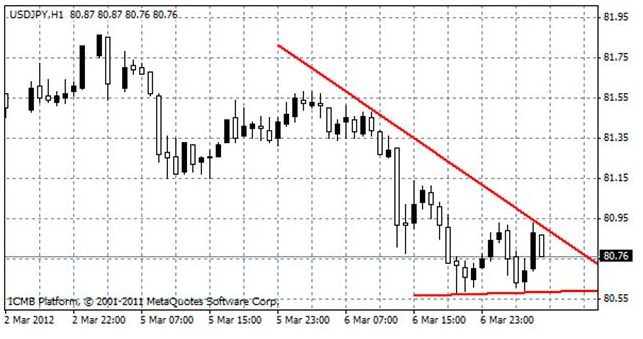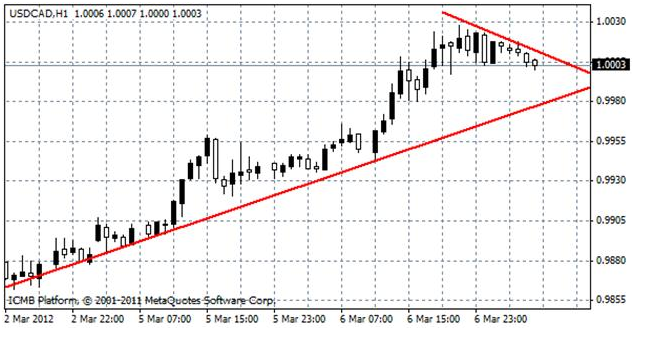The euro rose against the dollar on Wednesday, halting an earlier slide when reports emerged that despite financial institutions claiming they were on board to accept Greek restructuring terms, the overall number of private creditors needed to go forward on the deal were still lacking. In Asian trading on Wednesday, EUR/USD hit 1.3134, up 0.15%, gaining from a session low of 1.3112 and off from a high of 1.3134. The pair was likely to test technical support at 1.3104 and resistance at 1.3143.Greece needs 75% of its private creditors to formally accept terms of a restructuring by March 8. Private investors are set to forgive Greece 53.5% of their principal and swap their remaining holdings for new Greek bonds and notes from the European Financial Stability Facility. However, despite calls from banks and other financial institutions saying they were on board, in reality, only about 20% of private creditors themselves appeared ready, according to various wire reports, which spooked markets worldwide. Blessings from private creditors is a requirement for Greece to tap a EUR130 billion bailout fund and avoid a messy default, which would send shockwaves through financial systems worldwide. Meanwhile, the eurozone's revised fourth-quarter gross domestic product figures came in at -0.3%, in line with expectations. China's decision to set a 7.5% gross domestic product growth target for 2012, lower than what Beijing normally announces, also kept the euro weak and markets sagging in general. Bargain hunters brought the currency back into positive territory in early Asian trading, even if for a little while. The euro was up against the pound and down against the yen, withEUR/GBP trading up 0.07% at 0.8350 and EUR/JPY down 0.05% at 106.02. Later Wednesday in Europe, the Swiss National Bank is to publish data on foreign currency reserves, which provides investors with insights into the bank’s currency market operations. Germany is to release official data on factory orders, a leading indicator of production. The U.S. is to publish a report on ADP non-farm payrolls, which serves as a precursor to official government jobs data due out in two days. The country is also to release revised data on non-farm productivity and labor costs, which are important inflationary indicators, as well as a report on crude oil stockpiles. EUR/USD" title="EUR/USD" width="605" height="305">
EUR/USD" title="EUR/USD" width="605" height="305">
GBP/USD
The pound extended losses against the U.S. dollar on Tuesday, as fears that the euro zone may be entering recession territory and uncertainty over a Greek debt swap deal weighed on demand for riskier assets. Market sentiment weakened after data earlier confirmed that the euro zone’s gross domestic product shrank by a seasonally adjusted 0.3% in the last three months of 2011, in line with expectations and unchanged from a preliminary estimate. Annualized GDP contracted at a rate of 0.7%, also in line with expectations and unrevised from an initial estimate. The data fuelled concerns over the outlook for global growth, coming one day after Chinese Premier Wen Jiabao said his government will target expansion of 7.5% in 2012, the lowest GDP target in eight years. Meanwhile, concerns over a potential Greek default reemerged ahead of the March 8 deadline for the country’s private creditors to sign on to a EUR106 billion debt swap deal, a requirement for Athens to tap a recently approved EUR130 billion bailout fund. In the U.K., a report by the British Retail Consortium showed that total retail sales rose at an annualized rate of 2.3% in February, after a 2.1% gain the previous month. However, the report said like-for-like retail sales fell 0.3% on the year in February, after declining by the same amount in January. The pound was steady against the euro with EUR/GBP inching up 0.04%, to hit 0.8333. Also Tuesday, a report by mortgage lender Halifax showed that U.K. house prices fell unexpectedly in February, dropping 0.5% after rising by 0.6% in January, continuing the mixed monthly pattern seen over the past year. GBP/USD" title="GBP/USD" width="605" height="311">
GBP/USD" title="GBP/USD" width="605" height="311">
USD/JPY
The U.S. dollar was lower against the yen on Tuesday, as renewed concerns over Greece’s debt crisis and the economic outlook in the euro zone supported demand for the safe haven yen. USD/JPY hit 81.27 during early European trade, the daily low; the pair subsequently consolidated at 0.32%, shedding 0.32%. The pair was likely to find support at 80.83, the low of March 1 and resistance at 81.65, the high of February 27. The yen found support after China lowered its growth target and data pointed to the euro zone possibly slipping back into recession. Data showed on Monday that the euro zone's services sector contracted at a faster rate than initially estimated in February, shrinking for the fifth time in six months, while investor confidence improved less-than-expected this month, remaining in negative territory for the eighth consecutive month. Meanwhile, markets were also jittery ahead of the March 8 deadline for Greek bondholders to join the agreement under which they will exchange their existing Greek government bonds for new paper in a swap deal. The yen was higher against the euro with EUR/JPY declining 0.54%, to hit 107.21. Also Tuesday, government data showed that average cash earnings in Japan were unexpectedly flat in January, after a 0.1% rise the previous month. Analysts had expected average cash earnings to fall 0.3% in January. USD/JPY" title="USD/JPY" width="643" height="339">
USD/JPY" title="USD/JPY" width="643" height="339">
USD/CAD
The U.S. dollar climbed back above parity against its Canadian counterpart for the first time in six sessions on Tuesday, as demand for riskier assets was hit by growing concerns over whether Greece will be able to complete a debt swap deal. Concerns over the risk of a default by Greece mounted ahead of the March 8 deadline for the country’s private creditors to sign on to a EUR106 billion debt swap deal, a requirement for Athens to tap a recently approved EUR130 billion bailout fund. Earlier in the day, Greek finance minister Evangelos Venizelos strongly urged private sector creditors to take part in the debt swap deal and warned that it was the best offer they would receive. Meanwhile, worries over the outlook for the global economy lingered after China cut its 2012 growth target to 7.5% and after data confirmed that the euro zone economy contracted in the fourth quarter. The Canadian dollar also came under pressure as oil prices declined sharply, with crude oil contracts for delivery in April tumbling 1.75% on the New York Mercantile Exchange, to trade at USD104.86 a barrel. Raw materials, including oil account for about half of Canada’s export revenue. The loonie, as the Canadian dollar is sometimes known, was fractionally lower against the euro, with EUR/CAD inching up 0.02% to hit 1.3119. Later in the day, Canada was to release the Ivey Purchasing Managers Index. USD/CAD" title="USD/CAD" width="645" height="337">
USD/CAD" title="USD/CAD" width="645" height="337">
- English (UK)
- English (India)
- English (Canada)
- English (Australia)
- English (South Africa)
- English (Philippines)
- English (Nigeria)
- Deutsch
- Español (España)
- Español (México)
- Français
- Italiano
- Nederlands
- Português (Portugal)
- Polski
- Português (Brasil)
- Русский
- Türkçe
- العربية
- Ελληνικά
- Svenska
- Suomi
- עברית
- 日本語
- 한국어
- 简体中文
- 繁體中文
- Bahasa Indonesia
- Bahasa Melayu
- ไทย
- Tiếng Việt
- हिंदी
Major Currency Pairs Analysis: March 07, 2012
Published 03/07/2012, 08:00 AM
Updated 04/25/2018, 04:40 AM
Major Currency Pairs Analysis: March 07, 2012
EUR/USD
Latest comments
Loading next article…
Install Our App
Risk Disclosure: Trading in financial instruments and/or cryptocurrencies involves high risks including the risk of losing some, or all, of your investment amount, and may not be suitable for all investors. Prices of cryptocurrencies are extremely volatile and may be affected by external factors such as financial, regulatory or political events. Trading on margin increases the financial risks.
Before deciding to trade in financial instrument or cryptocurrencies you should be fully informed of the risks and costs associated with trading the financial markets, carefully consider your investment objectives, level of experience, and risk appetite, and seek professional advice where needed.
Fusion Media would like to remind you that the data contained in this website is not necessarily real-time nor accurate. The data and prices on the website are not necessarily provided by any market or exchange, but may be provided by market makers, and so prices may not be accurate and may differ from the actual price at any given market, meaning prices are indicative and not appropriate for trading purposes. Fusion Media and any provider of the data contained in this website will not accept liability for any loss or damage as a result of your trading, or your reliance on the information contained within this website.
It is prohibited to use, store, reproduce, display, modify, transmit or distribute the data contained in this website without the explicit prior written permission of Fusion Media and/or the data provider. All intellectual property rights are reserved by the providers and/or the exchange providing the data contained in this website.
Fusion Media may be compensated by the advertisers that appear on the website, based on your interaction with the advertisements or advertisers.
Before deciding to trade in financial instrument or cryptocurrencies you should be fully informed of the risks and costs associated with trading the financial markets, carefully consider your investment objectives, level of experience, and risk appetite, and seek professional advice where needed.
Fusion Media would like to remind you that the data contained in this website is not necessarily real-time nor accurate. The data and prices on the website are not necessarily provided by any market or exchange, but may be provided by market makers, and so prices may not be accurate and may differ from the actual price at any given market, meaning prices are indicative and not appropriate for trading purposes. Fusion Media and any provider of the data contained in this website will not accept liability for any loss or damage as a result of your trading, or your reliance on the information contained within this website.
It is prohibited to use, store, reproduce, display, modify, transmit or distribute the data contained in this website without the explicit prior written permission of Fusion Media and/or the data provider. All intellectual property rights are reserved by the providers and/or the exchange providing the data contained in this website.
Fusion Media may be compensated by the advertisers that appear on the website, based on your interaction with the advertisements or advertisers.
© 2007-2025 - Fusion Media Limited. All Rights Reserved.
